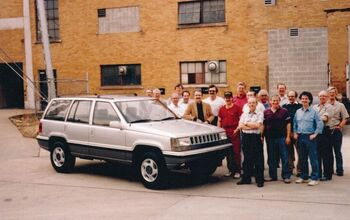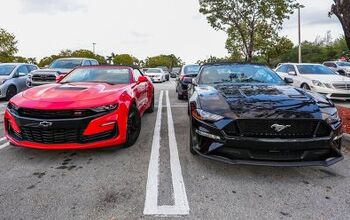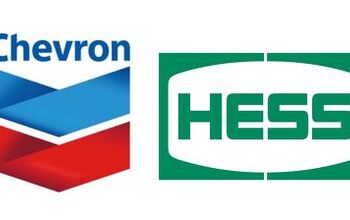In Defense of: American Automakers
I’d just slipped the nozzle into my Cadillac XLR-V. A dark Merc SL550 rolled up, its driver eyeing my Bowling Green Batmobile. As he busied himself with the credit card ritual, every few seconds his eyes darted sideways to the Caddy. “Mind if I look inside?” He sat behind the wheel, running his fingers across the interior surfaces. “Nice,” he pronounced. “Comfortable. And it’s easy to see out. There isn’t as much storage as my SL, but I’d be OK with that.” As he exited the XLR-V, he issued his verdict: “I wish I had the courage.”
“It’s been completely reliable,” I assured the SL guy, figuring he was wary of GM’s reputation for mechanical “mishaps.” “I’ve had it for over 23,000 miles without any problems.”
“That’s not what I meant,” he said. “I wish I had the courage to buy a car I’d have to explain to my friends. I love the style; I really admire it. But no one would understand if I bought a Cadillac. You have more guts than me.”
Americans scraped their way through the Depression, prevailed in two global wars, hung tough for 45 years of Cold War, went to the moon and opened our markets to help lift the world to prosperity. And now it comes to this: a man who likes a car designed and made by Americans in the United States– which he can clearly afford– is squeamish at the prospect of explaining an American-made automotive choice to his peers.
It may be unpopular to say it, but the existential threat to Detroit’s Big Three has a consumer component. There are 360 degrees of blame. Consumers must step up too.
Detroit’s products have changed. Whether you credit government intervention, consumer activism or foreign competition, there are no more rusting Vegas, exploding Pintos and 8-6-4 Cadillacs that can’t do math on the fly. As this website has pointed out on numerous occasions, product quality data says pretty much everything offered to American car buyers is mechanically reliable. Even if that salient fact hasn’t yet reached American consumer’s ears, reliability is not as important as it once was. Car choice often descends into pointless arguments over interior plastics, comparative depreciation and social acceptability.
This is why American manufacturers haven’t enjoyed the sales resurgence their new, improved products deserve: prejudice. American consumers share an irrational belief that American-made goods are inherently inferior to those produced by Japanese, German and even Korean manufacturers. A VW may find its way into the repair shop twice as often as a Chevrolet, but the German-branded car is still perceived as a higher quality product simply because it’s German.
A recent study by J.D. Power revealed that 80 percent of America's new car intenders won’t actively cross-shop either domestic or foreign, depending on their preference. While you can blame this horrific statistic on Detroit’s previous sins, it’s still a blanket condemnation of the Americans consumer’s idea of fair play. “You gotta put Mercury on your list,” the ad practically begs. And so it should be. Again, it may be unfashionable to suggest, but there is a penalty to pay for this blind bias against home-grown (or at least sold) products.
The United States is the only First World country projected to be substantially larger in population at the end of this century than it is today. The theory of comparative advantage says we should let our uncompetitive industries die. But of course, economists always neglect the human factor of politics. We have global responsibilities. We will continue to be a magnet for those with hope, and must accommodate an expanding, diverse population. We need a full-spectrum economy, not one divided between wealthy and struggling.
Manufacturing jobs are the bridge. As the US Department of Commerce reported in March, 2007:“Auto manufacturing remains one of the economy’s best paying industries. Production workers’ average hourly earnings were projected to reach $30.02 (excluding benefits) in 2006. Wages were 79 percent greater than the national average for all manufacturing industries.”
They also note that reductions in employment by GM, Ford and Chrysler will not be made up by transplant hiring. Beyond that, transplant sales do not support the tens of thousands of domestic high-salary headquarters jobs that a Detroit 3 purchase does today.
A holistic understanding of our mutual social contract suggests that we should at least give Detroit a fair shot at our patronage. In a 16 million units annual new vehicle market, can we find one million more buyers for the best, most competitive domestic iron?
Having driven the primary competitors in the volume car biz, I’m convinced that if a million import bigots dropped their bias against domestic iron and truly reconsidered what constitutes meaningful difference in a car comparison, they’d make the right choice– and not regret it. And we’d all be stronger for it.
More by Phil Ressler
Latest Car Reviews
Read moreLatest Product Reviews
Read moreRecent Comments
- Formula m Same as Ford, withholding billions in development because they want to rearrange the furniture.
- EV-Guy I would care more about the Detroit downtown core. Who else would possibly be able to occupy this space? GM bought this complex - correct? If they can't fill it, how do they find tenants that can? Is the plan to just tear it down and sell to developers?
- EBFlex Demand is so high for EVs they are having to lay people off. Layoffs are the ultimate sign of an rapidly expanding market.
- Thomas I thought about buying an EV, but the more I learned about them, the less I wanted one. Maybe I'll reconsider in 5 or 10 years if technology improves. I don't think EVs are good enough yet for my use case. Pricing and infrastructure needs to improve too.
- Thomas My quattro Audi came with summer tires from the factory. I'd never put anything but summer tires on it because of the incredible performance. All seasons are a compromise tire and I'm not a compromise kind of guy.

































Comments
Join the conversation
I got an email update yesterday about a post here that's not showing up in the thread. It was from "Musah": "WHAT HAPPENED TO PHIL AFTER THE BATTERING. PHIL IF YOU STILL CAN READ THIS LINK, WE, I FOR ONE MISS YOU ALOT!!!" Well...my end of year professional life inundates me and I have been under water. But I'm coming back imminently. I spent a lot of time at the L.A. Auto show Thanksgiving week as part of pulling my thoughts together on my next editorial and am working on that now. Will be back to TTAC straight away. Phil
The American automakers will pay huge money to get a customer to buy, then not spend ONE CENT to keep them! The Japanese are exactly the opposite - people line up to purchase their vehicles and they earn enough profit to look after their customers. They return again and again to purchase more vehicles. Look at what zero percent financing and all the cash rebates do to the resale of American cars. They aren't worth anything at resale.